This post contains affiliate links.
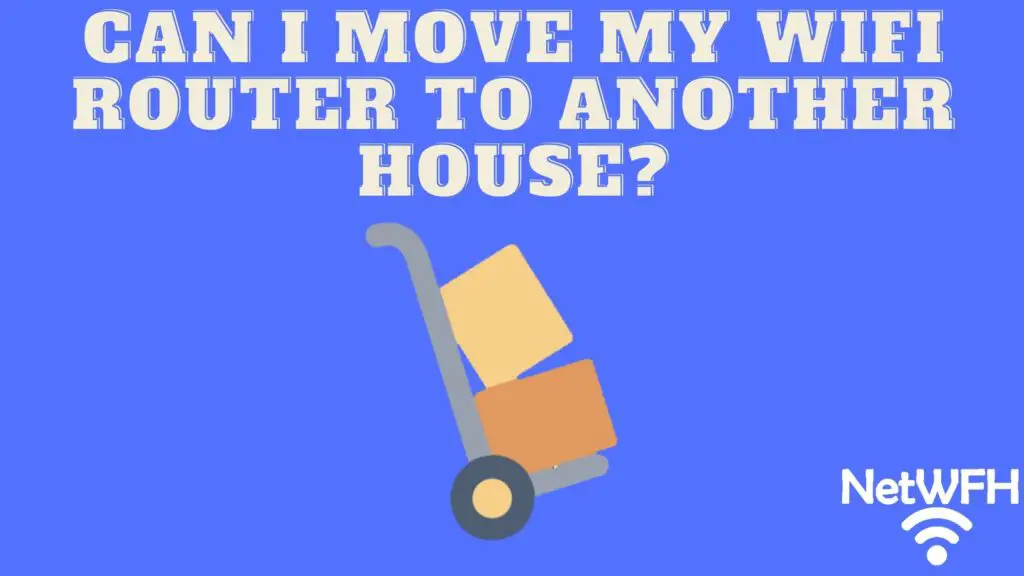
Moving can be an overwhelming experience.
If you’re moving, the last thing you’re thinking about is if your WiFi router will work in your new house or apartment. Chances are, this won’t cross your mind until you’re setting up your internet in the new location.
So the question remains: can a WiFi router be moved to another house?
As a general rule, a WiFi router can be moved to any house with a working modem and active internet connection. As long as the modem that will be connected to the router is functioning properly, the router will work regardless of its location.
I know this may sound confusing, but I will untangle this mess for you in this post.
I can speak from experience because I recently moved to a new house and I’m using the same modem and router that I had in my old apartment.
Hopefully my experience will help you get your internet humming along after you move.
My Experience Moving My WiFi Router
When I was getting ready to move, I had the same question that you did.
I wasn’t sure if I’d have to buy a new router for my home, or if I could use the one I already had (which was working perfectly).
I decided to find out for myself.
Hopefully in hearing my story you’ll understand what you might have to do with your router when you move.
Getting a New Internet Service
Before I go into the details of my experience, there’s important background you should know first.
When I was moving, I didn’t transfer my existing internet plan.
I needed to start a new internet plan, because my roommate was in charge of our internet account at my previous apartment. Both my previous internet plan and new internet plan were for cable internet.
On top of that, I rented a modem and router combination device from my ISP for a few months before setting up my own modem and router.
Why is this important?
As you’ll see later, this caused me to register my modem with the ISP to get my internet working.
Now that the necessary background information is out of the way, let’s get into the experiment.
Setting Up My Own WiFi Router
Let me set the scene.
At this point I had a working internet connection at my new home. I was using my the modem and router combination device that I was renting from my ISP.
This is what my internet setup looked like:

I was all packed up and ready to move from my apartment. At this point I wanted to set up my own modem and router in the new place.
I unplugged the modem and router at my apartment and moved them to my new home.
To make the setup easier, I put my rented modem and router combo device next to my own modem and router. That way, I’d be able to easily unplug the rented device and connect my own devices.
At this point, here’s what it looked like.
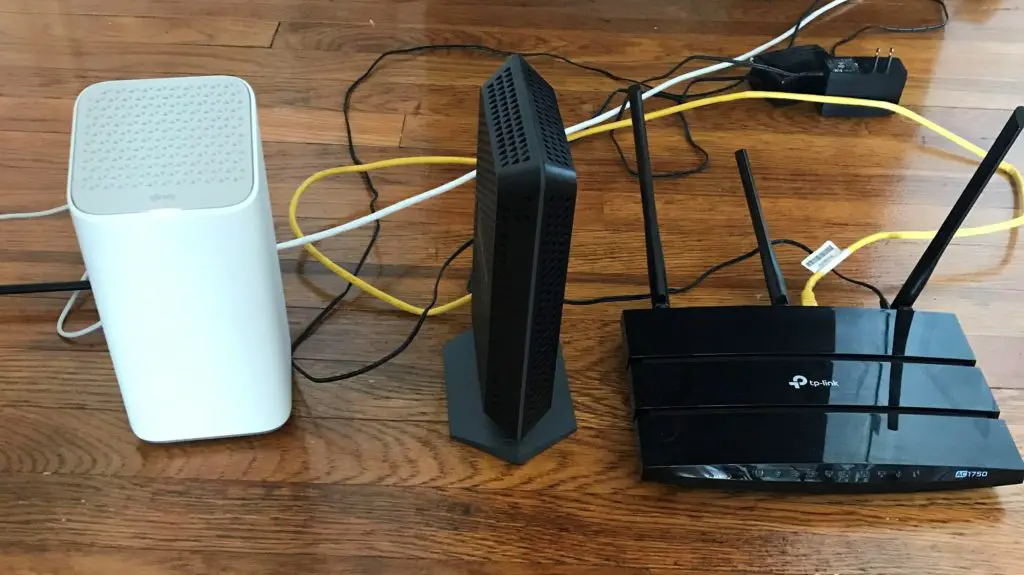
It was time to connect my own modem and router to my internet connection.
First, I made sure the rented modem and router combo device was powered off. Then I removed the internet cable from the back of the device.
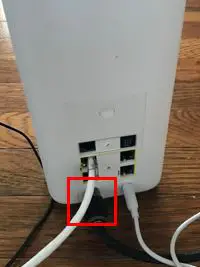
I attached the internet cable to the internet port of the modem that I own.
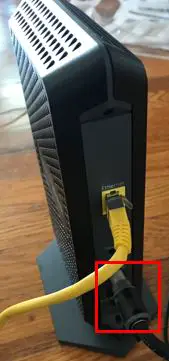
Next, I connected my modem and router together with an ethernet cable.
Lastly, I plugged both the power cords of my modem and router into outlets and crossed my fingers. Both of my devices powered on.
At this point, I was expecting my internet connection to start up and work like it did in my old apartment.
Unfortunately that’s not what happened.
Further Modem and Router Configuration
Much to my surprise, a few of the lights on my modem and router lit up orange instead of green.
Here’s what my modem looked like:
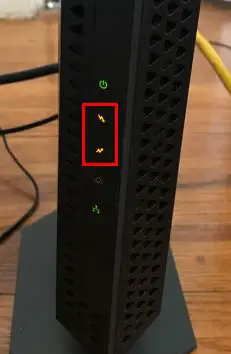
My router looked like this:
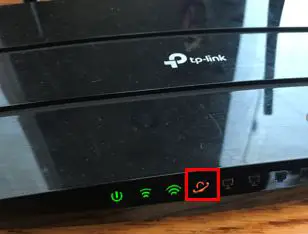
The bad news was that my internet wasn’t working and there seemed to be a problem with my modem and router.
The good news?
I knew what my modem lights and router lights were telling me. Something was wrong with my internet connection to my ISP.
To confirm this, I tried logging into my router’s settings. Here’s the notification I got.
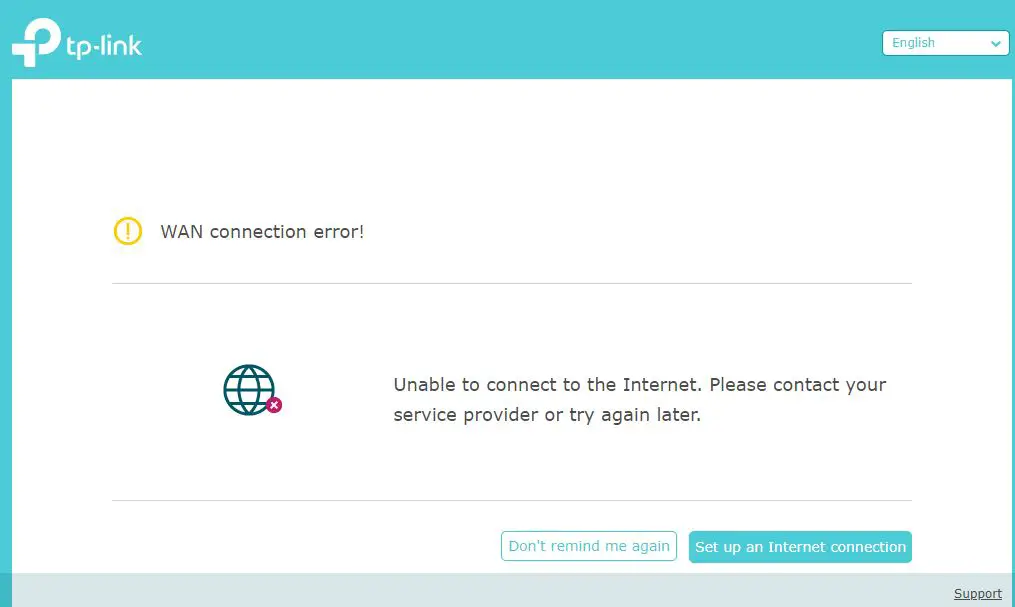
Thankfully, the fix was an easy one.
All I had to do was register the MAC address of my modem with my ISP. Once I did this (through my phone using the ISP’s setup app), the lights on both my modem and router turned green.
Here’s my modem after I registered its MAC address with the ISP:
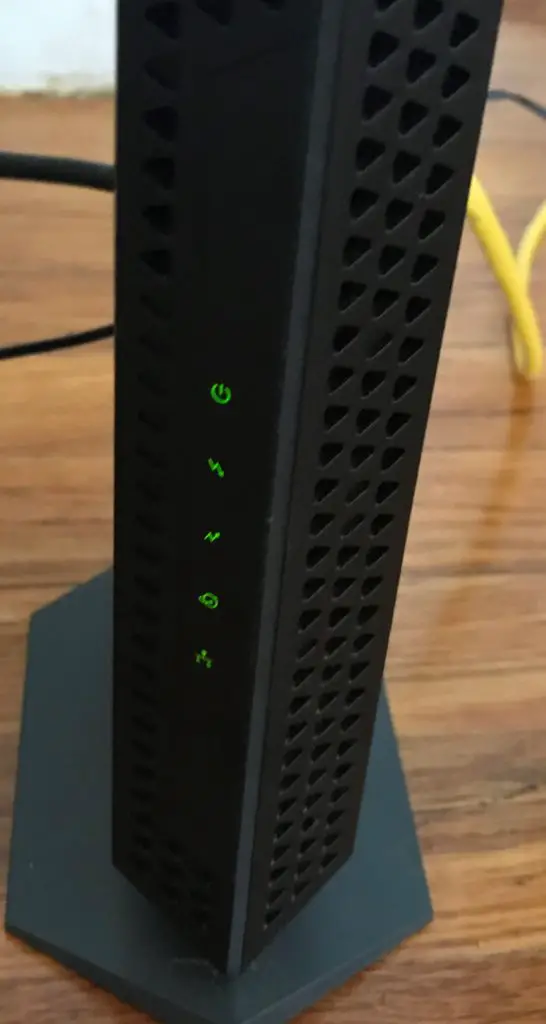
And here’s what my router looked like.
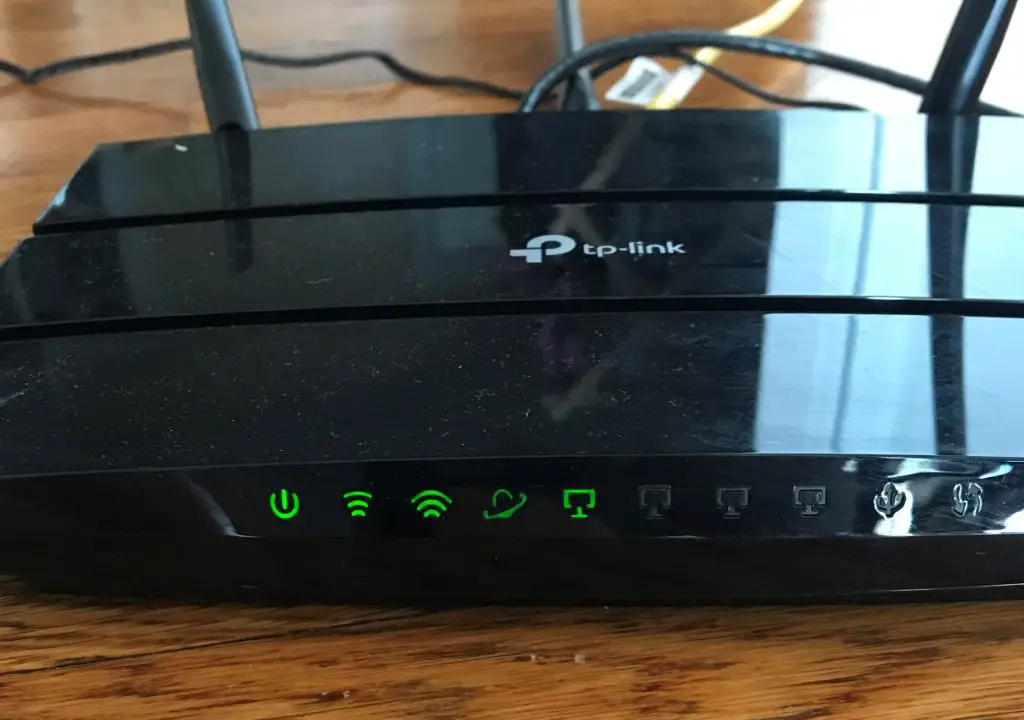
No further configuration was needed for my router. Once the modem was registered with the ISP, it was able to get a good internet connection from my modem.
As you can guess, I was able to get an internet connection once the lights on my modem and router were all green on both devices.
I was relieved to be able to move my WiFi router to a different location without having to buy a new one. I was equally as happy that I could do the same with my modem.
The experiment was a success. I was able to put all my internet worries behind me and focus on the task at hand: moving the rest of my stuff to my new home.
Things to Think About When Moving a Router to a New Location
There are a few things I learned from my experiment with moving my WiFi router that are important to consider if you’re looking to do the same thing.
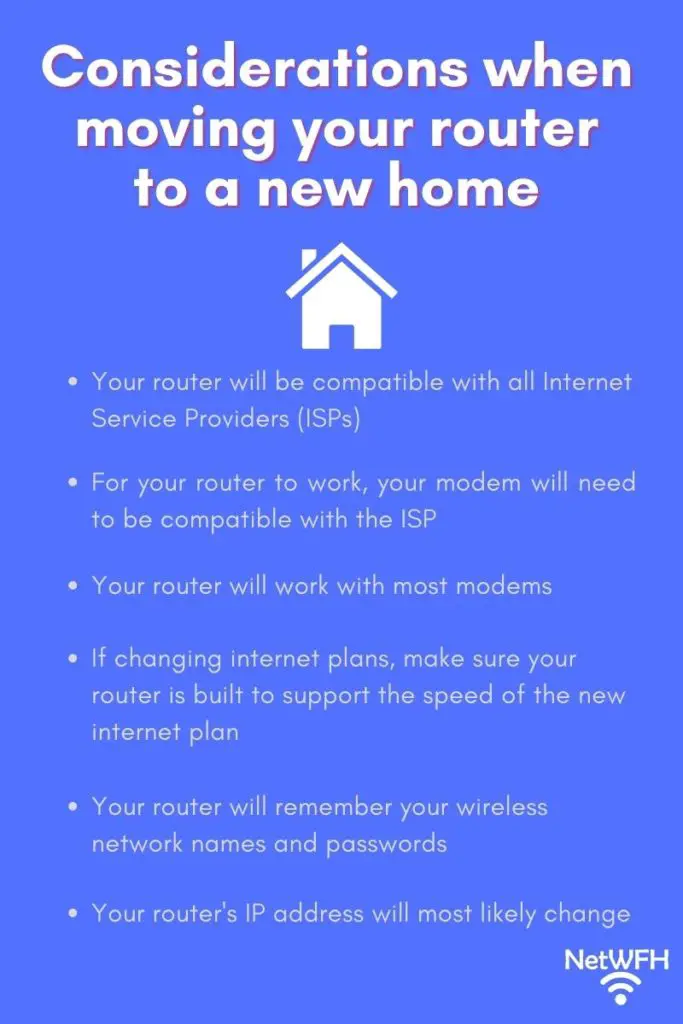
Your Router Is Compatible With All ISPs
When you’re moving your WiFi router, you don’t have to worry about the ISP you’re using. Routers work regardless of the ISP you have an internet plan with.
This is a bigger issue with modems. You need to make sure your modem is compatible with your ISP, or else it won’t work. If your modem won’t work, you won’t have internet access.
Your Router Will Work With Most Modems
Let’s say you’re moving and you’ll have a different ISP for your new home. As a result, you need to get a new modem that’s compatible with your new internet provider.
If this applies to you, you shouldn’t have to worry about your router. Routers that are used in home networks are compatible with the vast majority of modems. As long as they both have an RJ45 ethernet port (which almost all of them do), you should be in good shape.
What to Do if You Are Transferring Your Internet Plan
If you’re moving to an area where you can keep the same internet service provider, you should be able to transfer your internet service to the new location. This makes things easier on you because you won’t have to cancel your existing plan and go through the hassle of starting a new one.
When it comes to your router, you won’t have to worry about anything in this situation. So long as your modem is compatible with the ISP, it will work.
The only thing you may have to do is re-register your modem with your ISP at the new location. From there your router will be up and running.
What to Do if You Are Getting a New Internet Plan
Things aren’t much different if you sign up for a new internet plan. If this is the case, you won’t have to worry about your router as long as your modem works with the ISP.
The only consideration is if you sign up for a new internet plan with faster speeds. Depending upon the type of router your have, you may need to upgrade it so it can keep up with your internet plan.
If your router isn’t built to handle your internet plan, it can slow down your home internet.
Will My Wireless Networks Change if I Move My Router to A Different Location?
This is a big question that gets asked frequently.
If you move your router to a new location (and potentially get a new internet plan), will you have to set up your wireless networks again? Or will they stay the same?
When I moved my WiFi router to my new home, my wireless network names and passwords stayed the same. It was like I never left my previous apartment.
The reason for this is that your router has memory in it. When you change your router’s settings they get saved in your router’s memory. A perfect example of this is your wireless network names. Even when your device is turned off, it keeps that information in its memory for the next time it powers up.
This was a huge benefit for me.
All of my wireless devices automatically connected to my WiFi because they remembered the names of my wireless networks. This saved me from having to connect all my wireless devices to the internet again.
It was as if I never left my old apartment.
Will My Router’s IP Address Change if I Move to Another House?
Before I answer this question, it’s important to note that routers have two IP addresses. One IP address is used for your internal home network and is usually 192.168.0.1 or a similar address. The other IP address is externally facing. This IP address is used to allow devices on the internet to find the devices on your home network and vice versa.
Unless you’re moving to a location very close to where you were before, the external IP address of your router will most likely change. The internal IP address of your router will not change (unless you manually change it).
IP addresses are tied to geographic areas. If you move your WiFi router to a new house the geographic location of your device will also change.
This is not something you need to worry about.
Your external IP address change will happen automatically, as your modem will be assigned an IP address from you ISP. No action is required on your part.
In fact, you won’t even notice this has happened unless you have devices in your home network that can be accessed over the internet. If this sounds like your situation, you will need to reconfigure those devices for the new IP address.
Wrap Up
Hopefully your anxiety about moving your WiFi router to a new home or location has been relieved. You shouldn’t have much trouble moving it to your new home and keeping the same wireless networks that you had before.
If you have any questions or you would like to share your experiences about moving your router, please drop a comment below.
If you found this article interesting, you might be interested in these related topics as well:
What Do My Router Lights Mean?
What Do the Lights on My Modem Mean?
Does a Router Affect Your WiFi Speed?
